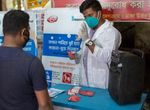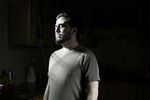Situation update w/c 20 April 2020 - WaterAid
←
→
Page content transcription
If your browser does not render page correctly, please read the page content below
Situation
update
The latest programme
updates from across our
work during COVID-19.
w/c 20 April 2020
A health worker
disinfects a
classroom at a
primary school
which is now
becoming a
shelter for the
homeless in
Antananarivo,
Madagascar.
WaterAid Ernest Randriarimalla
WaterAid/ Bangladesh
Handwashing
promotion and
COVID-19
prevention
campaigns in
Bangladesh.Situation update w/c 20 April 2020
Our response to
COVID-19
WaterAid/ Sibtain Haider
In many low- and middle-income WaterAid Pakistan has installed four
handwashing stations at various
countries, high numbers of people do locations in Muzaffargarh, Punjab,
not have soap and water to wash their with over 5,000 estimated daily
users.
hands or clean with, and practising
handwashing at key moments is not
widespread.
communities and partners to improve clean
In the least developed countries, nearly 3 in water and toilet facilities, and instill hygiene
4 people have nowhere at home to wash behaviour changes that mean people can
their hands with soap and water. This get the most out of improvements.
creates a higher risk of illnesses and
What are we doing?
diseases spreading – including COVID-19.
We are moving quickly to stem the spread of
Promoting good hygiene has been a core
COVID-19 in the countries where we work,
part of our work since we began. We are
supporting governments on hygiene
experts in working with governments,
promotion campaigns, installinghandwashing stations and scaling up our
existing work to change hygiene
behaviours:
We have been working closely with our
country programmes to begin lobbying
WaterAid Malawi
governments to ensure access to
water for the most vulnerable
communities.
Many of the countries where we work
have stepped up their hygiene
behaviour change campaigns: WaterAid Malawi Country Director Mercy Masoo
demonstrates how to wash hands during the handover
WaterAid Bangladesh has so far
ceremony of supplies to Lilongwe City Council, Malawi.
reached 17 million people and
WaterAid Pakistan has reached over 22
million people with hygiene messaging.
WaterAid South Africa and WaterAid Our Global COVID-19 Hub webpage is
Madagascar have focused on the now live, and features a new blog on
most vulnerable communities, water security amid COVID-19. Visit
supporting women and girls in wateraid.org/global-covid-19-
shelters, and supplying homeless response
communities with essential hygiene
kits. WaterAid India: Hygiene behaviour
WaterAid/Photographer
change campaign
WaterAid UK has joined the Hygiene-
Hub, a coalition of experts who are WaterAid India has completed an intensive
working together to help other eight- day hygiene behaviour change
countries design evidence-based campaign in seven different languages.
hygiene behaviour change campaigns. They worked together with partner
WaterAid/ Mani Karmacharya
WaterAid UK has also started updating organisations, community groups and
its Programme and Advocacy other key stakeholders to raise awareness
Framework, to support country of ‘Good Hygiene Practices to Prevent
programmes with response COVID-19’. To help spread the word, they
programmes for the next 12 months. created digital posters, audio messages
The Global Policy Team is leading the and video messages to distribute across
process of a policy change agenda on their networks, reaching over 1 million
behalf of WaterAid globally. people with their messaging.Situation update w/c 20 April 2020
Global overview and
country programme
updates
The latest COVID-19 global status
adequate surveillance and testing
The number of confirmed global COVID-19
facilities, the true number of confirmed
cases has exceeded 2 million this week,
cases is likely to be much higher.
doubling in less than 2 weeks. The global
death toll stands at over 150,000. While For the last two weeks, most affected
the global rate of transmission continues countries have been under a state of
to accelerate at approximately 100,000 lockdown or partial lockdown, including
new confirmed cases per day, some restrictions on movement, public
countries (mainly those in Europe, and gatherings and dusk to dawn curfews.
China) are starting to see rates of new Many of our offices are either fully or
confirmed cases either plateau or partially closed and most staff are
decrease. working from home.
WaterAid country update Social distancing
Most WaterAid countries continue to The term “Social distancing” has been
report new cases of COVID-19 on a daily renamed “physical distancing” by WHO, to
basis. While person-to-person underline the physical distance (2m)
transmission has been reported in most between people, and not that they should
countries, the World Health Organisation be cut off from others.
(WHO) indicates that a majority of these
cases occur in ‘clusters’, rather than
through the widespread community
transmission being seen in the US and
Europe. However, given that most
countries in Africa and Asia do not have
WaterAid Nepal has provided 50 gallons of surface
disinfectant, 17,000 surgical masks and 100 Personal
Protective Equipment (PPE) to the Management
Division of the Ministry of Health and Population.
They have also distributed soap and surgical masks to
the Dalit communities in Lahan, Siraha district,
Nepal.
WaterAid NepalCountry programmes
in action
Hygiene behaviour change Policy and advocacy
programmes Countries are pushing governments to
ensure continuity of water supply, especially
All countries where we work are running
for the most vulnerable.
hygiene awareness or behaviour change
campaigns, using social/digital/mass WaterAid Nigeria published a policy brief,
media to disseminate the messaging. calling on the government to urgently
provide WASH (water, sanitation and
Broadcast media
hygiene) facilities to marginalised
South Africa, Rwanda and Nepal teams populations and health facilities.
are all using leaders, celebrities and
In Uganda, the team are advocating for water
musicians in handwashing videos, and
supplies to be extended to marginalised
radio dramas about COVID-19.
populations; and in South Africa we are
WaterAid Madagascar is airing TV spots providing hygiene kits to women and girls in
and radio jingles on handwashing and domestic abuse shelters.
hygiene specifically for young people and
Our Liberia team are supporting the
children.
government in response efforts with
In Malawi, the team are using a public communication messages, distribution of
broadcaster to air COVID-19 messages. handwashing and hand hygiene materials,
supervision and implementation.
Senior WASH Manager, Vincent Casey, has
written a blog which outlines the key threats
to water services during the COVID-19
pandemic, and how to mitigate against
challenges to ensure more people can access
vital supplies.
WaterAid Ethiopia has offered 50 water tanks with
5,000 litre capacity, 2,500 litres of alcohol and over
1,000 bars of laundry soap to be distributed to health
centres and temporary COVID-19 treatment sites in
WaterAid Ethiopia Addis Ababa.Situation update w/c 20 April 2020
Sharing first-hand
experiences
Rwandan radio stars spread hygiene
message
WaterAid/Elena Heatherwick/People's Postcode Lottery
A group of young people in Rwanda have
been writing and producing a series of
radio dramas to teach listeners about the
vital role handwashing and sanitation play
in preventing the spread of diseases such
as COVID-19.
Photographer Elena Heatherwick has
created a series in collaboration with
WaterAid to show the radio producers at
work.
Read the full story:
bbc.co.uk/news/in-pictures-52292618
Lockdown diaries
Over a third of the world is currently in
lockdown due to the COVID-19
pandemic. Experiences of lockdown
differ vastly from country to country. Our
Voices from the Field officer Sibtain Haider
gives us his account of what lockdown is like
in Pakistan.
Read Sibtain’s lockdown diary:
wateraid.org/uk/blog/lockdown-from-a-
basement-apartment-in-pakistan
Our next situation update will be available from the week
commencing Monday 4 May.
For the latest updates , visit wateraid.org/global-covid-19-
responseYou can also read

























































